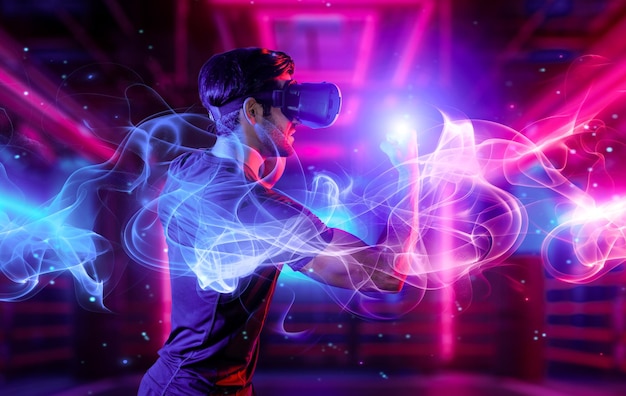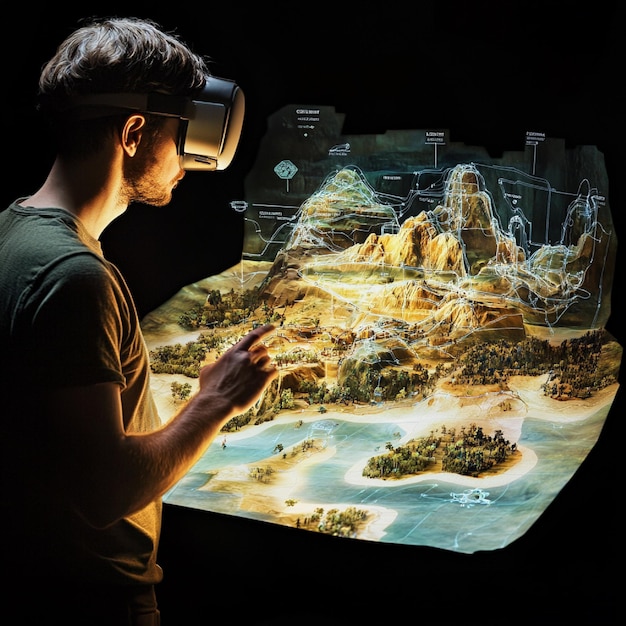Escape Reality: Exploring VR Entertainment

Escape Reality: Exploring the Immersive World of Virtual Reality Entertainment offers unprecedented immersive experiences, redefining entertainment through interactive simulations, gaming, and virtual tourism from the comfort of one’s home.
Ready to ditch the humdrum and dive headfirst into worlds unknown? Escape Reality: Exploring the Immersive World of Virtual Reality Entertainment isn’t just a catchy phrase; it’s a promise. It’s about stepping beyond the screen and into experiences that blur the line between real and digital.
Understanding the Core of VR Entertainment
Virtual Reality (VR) entertainment is rapidly evolving, offering users the chance to immerse themselves in simulated environments. It’s more than just gaming; it’s a portal to experiences that redefine how we perceive and interact with media.
At its essence, VR entertainment leverages cutting-edge technology to create an interactive and engaging experience. This technology transports users to different worlds, engaging their senses in ways that traditional media cannot.
The Technology Behind the Magic
VR headsets use sophisticated displays and sensors to track head movements and present stereoscopic 3D images. This creates a sense of depth and presence, making the experience feel incredibly real. Motion tracking and spatial audio further enhance the immersion.
Input devices like hand controllers allow users to interact with the virtual environment. Advanced haptic feedback systems can even simulate the sensation of touch, further blurring the line between the real and virtual worlds.
- Headsets: Devices that display the VR environment.
- Controllers: Tools for interacting within the VR space.
- Software: Applications and games that provide VR experiences.

In conclusion, VR entertainment has become a game-changing innovation with its technology, redefining how we perceive and interact with media. By understanding the core technology one can truly unlock the potential of VR experiences.
Gaming Reimagined: The VR Revolution
Gaming has always been at the forefront of technological innovation, and VR is no exception. VR gaming offers a level of immersion unmatched by traditional gaming experiences. It allows players to step into the game world, becoming active participants in the narrative.
From epic adventures to intense competitive battles, VR gaming offers a wide range of genres to suit every taste. The ability to physically interact with the game world adds a new layer of depth and excitement to the experience.
Popular VR Game Genres
VR gaming spans genres like action, adventure, puzzle, and simulation. Each genre offers unique experiences, leveraging VR’s immersive capabilities to engage players in new and exciting ways. Multiplayer VR games allow players to connect and compete in shared virtual environments.
Many popular titles have been adapted for VR, offering familiar gameplay with a fresh, immersive twist. New VR-exclusive games are also constantly being developed, pushing the boundaries of what’s possible in virtual reality.
- Action: Fast-paced combat and exploration.
- Puzzle: Brain-teasing challenges in VR.
- Simulation: Realistic and immersive simulations.
VR has revolutionized the gaming experience by transforming the action, interaction and the overall immersive dynamics, allowing players to go where they have never gone and become someone new. Truly immersing players into endless exploration.
Beyond Gaming: VR for Travel and Tourism
VR isn’t just for gamers; it’s also transforming how we experience travel and tourism. Virtual tourism offers a way to explore destinations around the world from the comfort of your own home. It provides an accessible and immersive alternative to traditional travel.
VR travel experiences can range from guided tours of historical sites to adventurous explorations of remote landscapes. They offer a unique opportunity to see the world in a new way, without the need for physical travel.
Virtual Exploration and Discovery
VR tourism allows users to visit places they might never be able to see in real life. Whether it’s exploring ancient ruins or diving into the depths of the ocean, VR offers unparalleled access to incredible destinations. Educational VR experiences provide informative insights into the history and culture of different locations.
For those with mobility issues or budget constraints, VR travel can be especially valuable. It offers a chance to experience the world without the barriers of physical travel. VR travel can also serve as a preview for future real-world trips.
- Historical sites: Explore ancient wonders in VR.
- Natural landscapes: Discover remote and beautiful locations.
- Educational tours: Learn about different cultures and histories.

In summary, VR tourism takes travel to a whole new level by offering exciting adventures without the need to leave home. Its affordable and accessible features make it open to many users and provide a dynamic, interactive experience.
The Social VR Experience: Connecting in Virtual Worlds
VR is also becoming a powerful tool for social connection. Social VR platforms allow users to interact with others in shared virtual environments. These platforms offer a new way to connect with friends, family, and colleagues, regardless of physical location.
From virtual meetings to collaborative workspaces, social VR is transforming how we communicate and collaborate. It offers a more engaging and immersive alternative to traditional video conferencing.
Building Communities in VR
Social VR platforms provide tools for creating avatars, customizing virtual spaces, and engaging in shared activities. Users can attend virtual events, participate in group games, or simply hang out and chat with friends.
These platforms can help bridge the gap between physical and digital interactions, fostering a sense of community and belonging. They offer new opportunities for social interaction for those who may have difficulty connecting in the real world.
This technology includes:
- Virtual meetings: Conduct business in immersive virtual offices.
- Social events: Attend virtual parties, concerts, and conferences.
- Collaborative spaces: Work together on projects in VR.
To summarize, Social VR is more than just a technological innovation; it’s a powerful tool that transforms how we connect, collaborate, and build communities regardless of the user’s location. It’s the future of social interaction, connecting people in ways never before imagined.
Health and Wellness: Therapeutic Applications of VR
VR’s potential extends beyond entertainment and social connection. It’s also being used in healthcare to treat a variety of conditions. VR therapy offers new ways to manage pain, anxiety, and phobias, and is transforming patient care.
VR simulations can create controlled environments for patients to practice coping skills and overcome their fears. This can be especially helpful for those with anxiety disorders or PTSD.
VR as a Treatment Tool
VR is used to treat phobias by exposing patients to their fears in a safe and controlled environment. It’s also being explored as a tool for pain management, as it can distract patients from their discomfort. Rehabilitation programs use VR to help patients recover from injuries and improve motor skills.
The immersive nature of VR can make therapy more engaging and effective. It offers a non-invasive way to address mental and physical health challenges., proving itself to be extremely valuable.
Key applications in health and wellness include:
- Phobia treatment: Overcome fears in a virtual environment.
- Pain management: Distract from discomfort and reduce reliance on medication.
- Rehabilitation: Improve motor skills and coordination.
In conclusion, VR therapy has proven itself to be a key application in health and wellness. Giving patients the opportunity to improve motor skills, overcome fears and distract from discomfort is transformative. VR is improving people’s lives through innovation in healthcare.
The Future of VR Entertainment: Trends and Predictions
The future of VR entertainment is bright, with many exciting developments on the horizon. As technology continues to advance, VR experiences will become even more immersive and realistic. New applications and use cases are constantly emerging.
Advancements in hardware, such as higher resolution displays and more accurate tracking systems, will enhance the VR experience. Improvements in software will allow for more complex and engaging virtual environments.
Emerging Trends in VR
One trend is the increasing integration of artificial intelligence (AI) into VR experiences. AI can create more dynamic and responsive virtual environments, personalizing the experience for each user. Another trend is the development of more affordable and accessible VR headsets.
The rise of 5G networks will also play a significant role in the future of VR. Faster and more reliable internet connections will enable higher quality streaming of VR content. Overall making these experiences more desirable than the regular.
Trends that will shape the future of VR include:
- AI integration: Creating more dynamic and personalized experiences.
- Affordable headsets: Making VR accessible to a wider audience.
- 5G connectivity: Enabling higher quality streaming and more immersive environments.
Closing thoughts: VR entertainment is on the brink of even more remarkable advancements. The integration of AI, affordable headsets, and enhanced connectivity is paving the way for highly immersive, personalized, and accessible experiences. This future promises to transform how we play, explore, connect, and heal.
| Key Element | Brief Description |
|---|---|
| 🎮 VR Gaming | Immersive games with realistic interaction. |
| 🌍 VR Travel | Virtual exploration of landmarks and destinations. |
| 🧑🤝🧑 Social VR | Connecting with others in virtual spaces. |
| 🏥 VR Therapy | Treating phobias and enhancing rehabilitation. |
Frequently Asked Questions
▼
VR entertainment uses technology to create immersive, interactive experiences, ranging from gaming and travel to social interactions and therapeutic applications.
▼
VR gaming allows players to step into the game world, providing a more realistic and interactive experience where they become part of the narrative.
▼
Yes, VR offers virtual tourism, allowing users to explore destinations worldwide from their homes. This includes historical exploration and adventures in remote landscapes.
▼
Social VR platforms allow users to connect and interact in shared virtual environments, including attending virtual events, participating in group games, and collaborating in virtual workspaces.
▼
Indeed! VR therapy is used to treat phobias, manage pain, and assist in rehabilitation, providing controlled environments to practice coping skills and overcome fears.
Conclusion
Escape Reality: Exploring the Immersive World of Virtual Reality Entertainment offers an unparalleled experience, whether you seek thrilling adventures, social connections, or therapeutic solutions. As VR technology advances, it’s expanding into various aspects of our lives, promising a future where the lines between reality and the virtual realm become increasingly blurred.